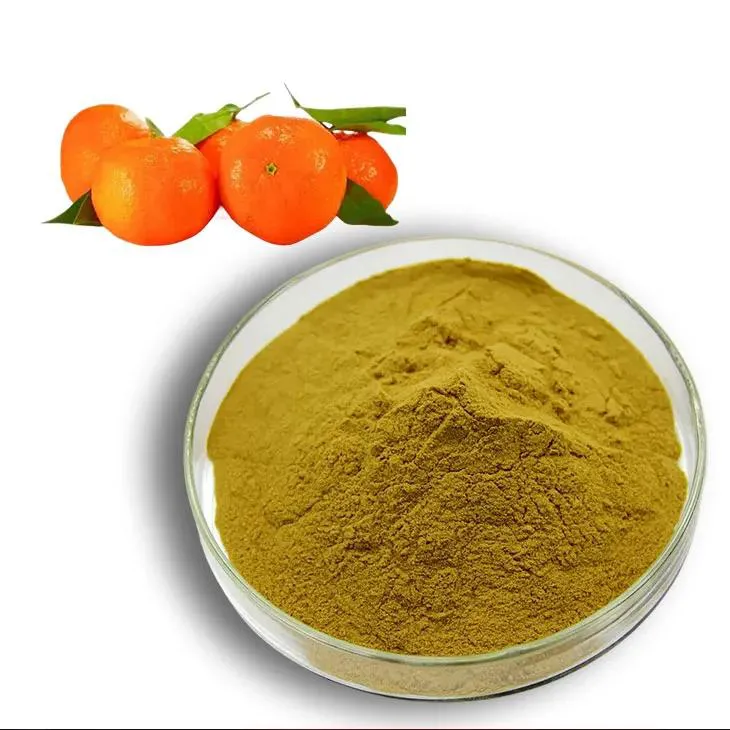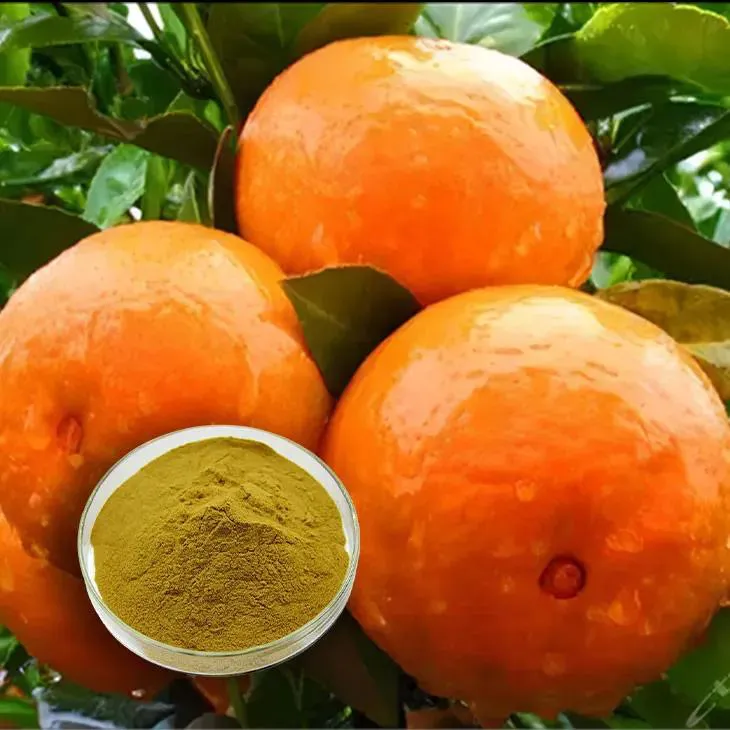- 0086-571-85302990
- sales@greenskybio.com
Citrus bioflavonoids: nature's best - kept secret.
2024-11-12

Introduction
Citrus fruits have long been a staple in human diets, known for their refreshing taste and high vitamin C content. However, there is a group of compounds within these fruits that has been somewhat overlooked until recently - the citrus bioflavonoids. These bioflavonoids are nature's best - kept secret, with a wide range of health - promoting properties that are only now beginning to be fully understood.

What are Citrus Bioflavonoids?
Citrus bioflavonoids are a class of plant - based compounds that are found in the peels, pulp, and seeds of citrus fruits such as oranges, lemons, grapefruits, and limes. They are part of a larger family of flavonoids, which are known for their antioxidant and anti - inflammatory properties. There are several different types of citrus bioflavonoids, including Hesperidin, naringenin, and Quercetin, each with its own unique chemical structure and potential health benefits.

Antioxidant Properties
One of the most important functions of citrus bioflavonoids is their role as antioxidants. Antioxidants are substances that can protect cells from damage caused by free radicals. Free radicals are unstable molecules that are produced during normal cellular metabolism as well as in response to environmental factors such as pollution, radiation, and cigarette smoke. If left unchecked, free radicals can cause oxidative stress, which has been linked to a wide range of health problems, including cancer, heart disease, and neurodegenerative disorders.
Citrus bioflavonoids work by donating electrons to free radicals, thereby neutralizing them and preventing them from causing damage to cells. In addition to this direct antioxidant activity, citrus bioflavonoids can also enhance the antioxidant activity of other compounds, such as vitamin C. In fact, research has shown that bioflavonoids can increase the absorption and utilization of vitamin C in the body, making it more effective at fighting free radicals.

Benefits for the Immune System
The immune system is our body's defense against foreign invaders such as bacteria, viruses, and fungi. A strong immune system is essential for maintaining good health and preventing illness. Citrus bioflavonoids have been shown to have a positive impact on the immune system in several ways.
Firstly, their antioxidant properties help to protect immune cells from oxidative damage, allowing them to function more effectively. Secondly, citrus bioflavonoids can stimulate the production of immune - enhancing cytokines, which are small proteins that play a key role in the immune response. Thirdly, some studies have suggested that citrus bioflavonoids may have antiviral and antibacterial properties, helping to fight off infections directly.
Promoting Vitamin C Absorption
As mentioned earlier, citrus bioflavonoids can enhance the absorption of vitamin C. Vitamin C is an essential nutrient that is required for many functions in the body, including collagen synthesis, wound healing, and immune function. However, the body has a limited ability to absorb vitamin C on its own, and much of it can be lost through excretion if not properly absorbed.
Citrus bioflavonoids can improve the bioavailability of vitamin C by protecting it from oxidation in the digestive tract and facilitating its transport across cell membranes. This means that consuming citrus fruits or supplements that contain both vitamin C and bioflavonoids can result in higher levels of vitamin C in the body, providing greater health benefits.
Potential Role in Preventing Chronic Diseases
Cancer Prevention
There is growing evidence to suggest that citrus bioflavonoids may play a role in cancer prevention. Their antioxidant and anti - inflammatory properties can help to reduce oxidative stress and inflammation in the body, which are two key factors in the development of cancer. In addition, some studies have shown that citrus bioflavonoids can inhibit the growth and spread of cancer cells in vitro and in animal models.
For example, Hesperidin has been shown to induce apoptosis (programmed cell death) in cancer cells, while naringenin has been found to have anti - angiogenic properties, meaning it can prevent the formation of new blood vessels that are necessary for tumor growth. However, more research is needed to fully understand the potential of citrus bioflavonoids in cancer prevention and treatment.
Heart Health
Heart disease is one of the leading causes of death worldwide. Citrus bioflavonoids may offer several benefits for heart health. Their antioxidant activity can help to prevent the oxidation of low - density lipoprotein (LDL) cholesterol, which is a major risk factor for heart disease. Oxidized LDL cholesterol can accumulate in the arteries, leading to the formation of plaques and increasing the risk of heart attacks and strokes.
In addition, citrus bioflavonoids can improve endothelial function, which is the ability of the cells lining the blood vessels to regulate blood flow and prevent blood clotting. Some studies have also shown that citrus bioflavonoids can lower blood pressure, another important risk factor for heart disease. For example, Hesperidin has been found to have a mild hypotensive effect in some animal and human studies.
Neurodegenerative Diseases
Neurodegenerative diseases such as Alzheimer's and Parkinson's are characterized by the progressive loss of neurons in the brain. Oxidative stress and inflammation are thought to play a role in the development of these diseases. Citrus bioflavonoids, with their antioxidant and anti - inflammatory properties, may offer some protection against neurodegenerative diseases.
Some studies have shown that citrus bioflavonoids can cross the blood - brain barrier and exert their effects directly on the brain. For example, Quercetin has been found to have neuroprotective effects in animal models of Alzheimer's disease, reducing amyloid - beta deposition and improving cognitive function. However, more research is needed to determine the effectiveness of citrus bioflavonoids in preventing and treating neurodegenerative diseases in humans.
How to Incorporate Citrus Bioflavonoids into Your Diet
The easiest way to get citrus bioflavonoids is by consuming citrus fruits on a regular basis. Oranges, lemons, grapefruits, and limes are all excellent sources of bioflavonoids. You can eat them whole, drink their juices, or use their peels in cooking or baking (although be sure to wash the peels thoroughly to remove any pesticides or contaminants).
If you prefer supplements, there are also many citrus bioflavonoid supplements available on the market. However, it is important to choose a high - quality supplement from a reputable manufacturer and to follow the recommended dosage instructions. Some supplements may contain other ingredients in addition to bioflavonoids, so it is also important to check the label carefully.
Conclusion
Citrus bioflavonoids are a hidden gem in the world of nutrition. With their antioxidant, anti - inflammatory, and immune - enhancing properties, they offer a wide range of potential health benefits. From promoting better absorption of vitamin C to potentially preventing chronic diseases such as cancer, heart disease, and neurodegenerative disorders, these natural compounds are truly nature's best - kept secret. By incorporating citrus fruits or supplements into our diets, we can unlock the mystery of these powerful compounds and take advantage of their many health - promoting properties.
FAQ:
What are citrus bioflavonoids?
Citrus bioflavonoids are natural compounds found in citrus fruits. They are a type of plant pigment that has various beneficial properties for health.
What are the antioxidant properties of citrus bioflavonoids?
The antioxidant properties of citrus bioflavonoids help in protecting cells from damage. They can neutralize free radicals in the body, which are unstable molecules that can cause oxidative stress and harm cells. By doing so, they contribute to overall health and may help in preventing various diseases associated with oxidative damage.
How do citrus bioflavonoids promote the absorption of vitamin C?
Citrus bioflavonoids enhance the absorption of vitamin C. They work in synergy with vitamin C, helping the body to better utilize it. This interaction can improve the overall effectiveness of vitamin C in the body, for example, in collagen synthesis and immune function support.
What is the impact of citrus bioflavonoids on the immune system?
Citrus bioflavonoids can have a positive impact on the immune system. They may help in enhancing the body's defense mechanisms by promoting the production and activity of immune cells. This can potentially increase the body's ability to fight off infections and diseases.
Can citrus bioflavonoids prevent chronic diseases?
There is evidence to suggest that citrus bioflavonoids may play a role in preventing chronic diseases. Their antioxidant and anti - inflammatory properties, as well as their impact on various physiological processes in the body, might contribute to reducing the risk of chronic conditions such as heart disease, cancer, and diabetes. However, more research is still needed to fully understand their preventive potential.
Related literature
- The Role of Citrus Bioflavonoids in Health and Disease"
- "Citrus Bioflavonoids: A Comprehensive Review of Their Biological Activities"
- "Bioflavonoids from Citrus Fruits: Potential Health Benefits and Therapeutic Applications"
- ▶ Hesperidin
- ▶ citrus bioflavonoids
- ▶ plant extract
- ▶ lycopene
- ▶ Diosmin
- ▶ Grape seed extract
- ▶ Sea buckthorn Juice Powder
- ▶ Beetroot powder
- ▶ Hops Extract
- ▶ Artichoke Extract
- ▶ Reishi mushroom extract
- ▶ Astaxanthin
- ▶ Green Tea Extract
- ▶ Curcumin Extract
- ▶ Horse Chestnut Extract
- ▶ Other Problems
- ▶ Boswellia Serrata Extract
- ▶ Resveratrol Extract
- ▶ Marigold Extract
- ▶ Grape Leaf Extract
- ▶ blog3
- ▶ blog4
- ▶ blog5
-
Organic Tongkat Ali extract powder factory.
2024-11-12
-
How to make powder with ashwagandha extract.
2024-11-12
-
Rosehip extract manufacturers from China.
2024-11-12
-
The best cat's claw extract in nature.
2024-11-12
-
Chinese Dandelion Leaf Extract Suppliers.
2024-11-12
-
Green Tea Extract
2024-11-12
-
Cat Claw Extract
2024-11-12
-
White Willow Bark Extract
2024-11-12
-
melatonin extract
2024-11-12
-
Aguaje Extract
2024-11-12
-
Agaricus Blazei Extract
2024-11-12
-
Hawthorn Extract
2024-11-12
-
Kupilu Extract
2024-11-12
-
Hesperidin
2024-11-12
-
Calendula Extract
2024-11-12





















